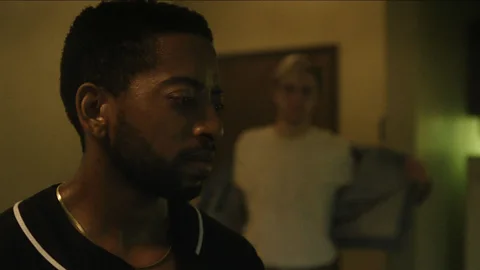Monster: Jeffrey Dahmer: Did TV go too far in 2022?
 Alamy/Netflix
Alamy/NetflixNo 2022 show was more controversial than Ryan Murphy's Netflix show about the serial killer – but there were other real-life dramas that raised ethical concerns too, writes Hugh Montgomery.
Few recent cultural works have shown up the divide between critics and audiences quite like this year's awkwardly-titled Netflix series Dahmer – Monster: The Jeffrey Dahmer Story. The drama about notorious US serial killer Jeffrey Dahmer, who murdered 17 young men and boys between 1978 and 1991, was released mid-week in September on the streaming service, with little pre-publicity and no previews made available for press – a common indication that the show or film in question isn't much good. And duly, the media verdicts that did come in were mostly pretty harsh.
More like this:
By contrast, though, viewing figures proved astronomical: according to Netflix's self-declared ratings, it was watched for 196.2 million hours in its first week of release, at the time giving it the best opening week for a new show on the streaming platform ever, while within 60 days it reached 1 billion hours viewed, placing it in the rare echelons of other globe-conquering cultural phenomena Stranger Things and Squid Game. Whether all those eyeballs on it were favourable – though a 83% audience score on Rotten Tomatoes would suggest most of them were – undeniably people could not stop watching its incredibly grim story play out. And matching the size of its cultural footprint has been the level of debate that it has stirred.
 Alamy/Netflix
Alamy/NetflixThe root of that contentiousness is perhaps best illustrated by a comparison with another true-crime drama, featuring a number of narrative parallels, which premiered at the very beginning of the year. The BBC miniseries Four Lives also focused on the horrific case of a serial killer who murdered young gay men, Stephen Port, as well as the resulting police failings in dealing with the victims' cases that were alleged by some to be driven by institutional prejudice (homophobia in the Port case and both homophobia and racism in the Dahmer one). Except the whole style and tone of Four Lives was sombre and restrained: when Port appeared, he was a pointedly blank, banal ing character, with no backstory sketched in, while from the title onwards, the show emphasised that this was the story of his four victims only – or rather the victims' families, for the most part, who consented to and/or cooperated with the show and were depicted fighting for justice for their loved ones.
Where Four Lives was sober, though, Dahmer was unabashedly lurid. In its first half in particular, it centred firmly on the killer, played by Evan Peters, taking us inside his world and flashing back to his early development and broken family life while, in the present timeline, featuring graphic, extended sequences of him entrapping his targets within his grisly apartment. Creator Ryan Murphy made his name in part with the homage-filled horror of his anthology series American Horror Story, and here he leans once more into the grammar of horror – the bolts going across the door, the ominous pan across the drill on the kitchen workspace – in ratcheting up the sense of dread. As reviewer Jack King wrote for GQ "it feels as though Murphy is aping the likes of The Texas Chainsaw Massacre and The Hills Have Eyes, Peters' performance not so distant from a socially-stunted Hannibal Lecter".
What's more, it was made without the consent of any of the victims' families – and since its release, a number of them have publicly expressed their upset at the show's existence. That has compounded the feeling among many critics that the show isn't simply bad, it is indecent. The Guardian asked "Is Ryan Murphy's Jeffrey Dahmer show the most exploitative TV of 2022">window._taboola = window._taboola || []; _taboola.push({ mode: 'alternating-thumbnails-a', container: 'taboola-below-article', placement: 'Below Article', target_type: 'mix' });
